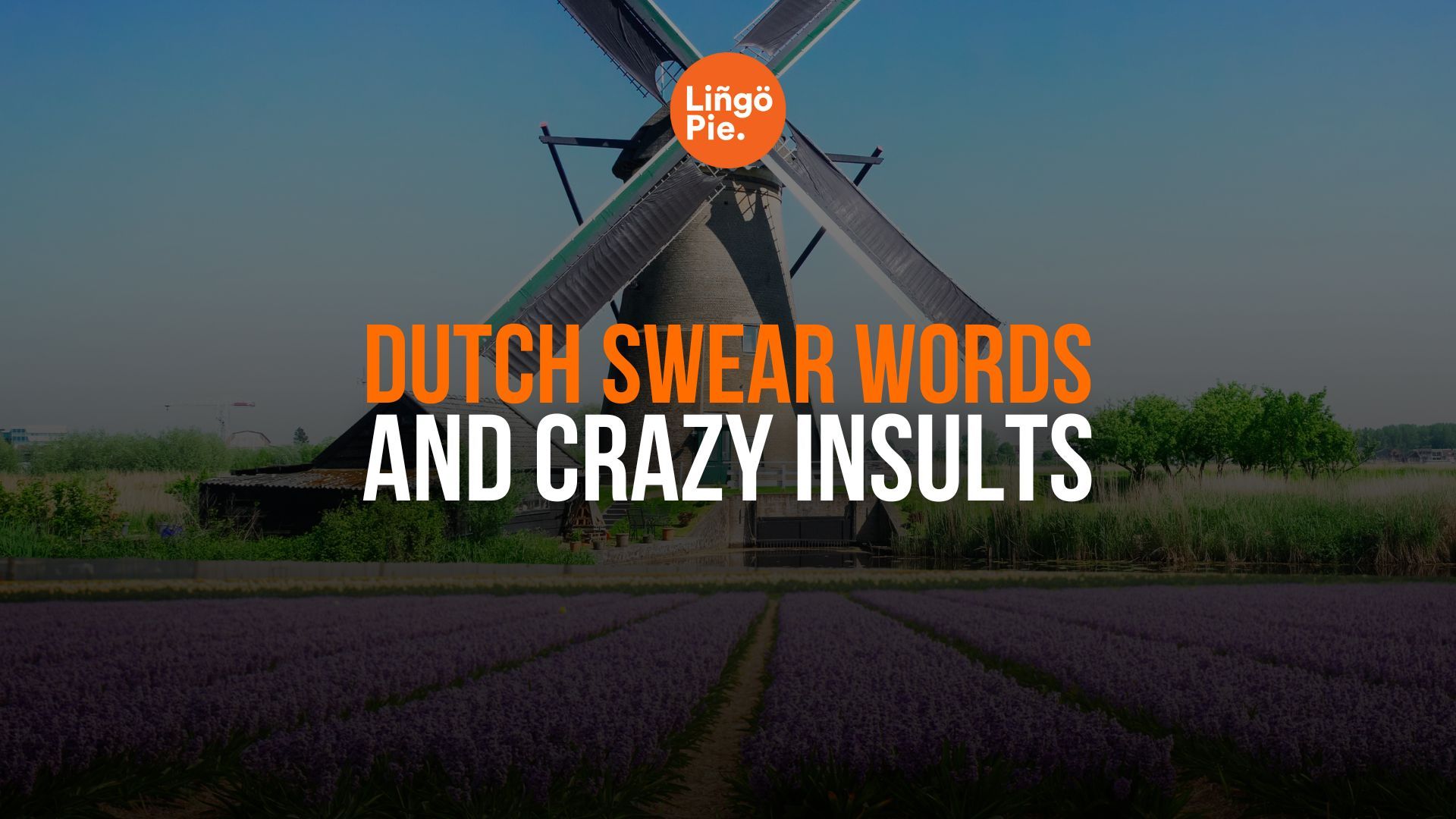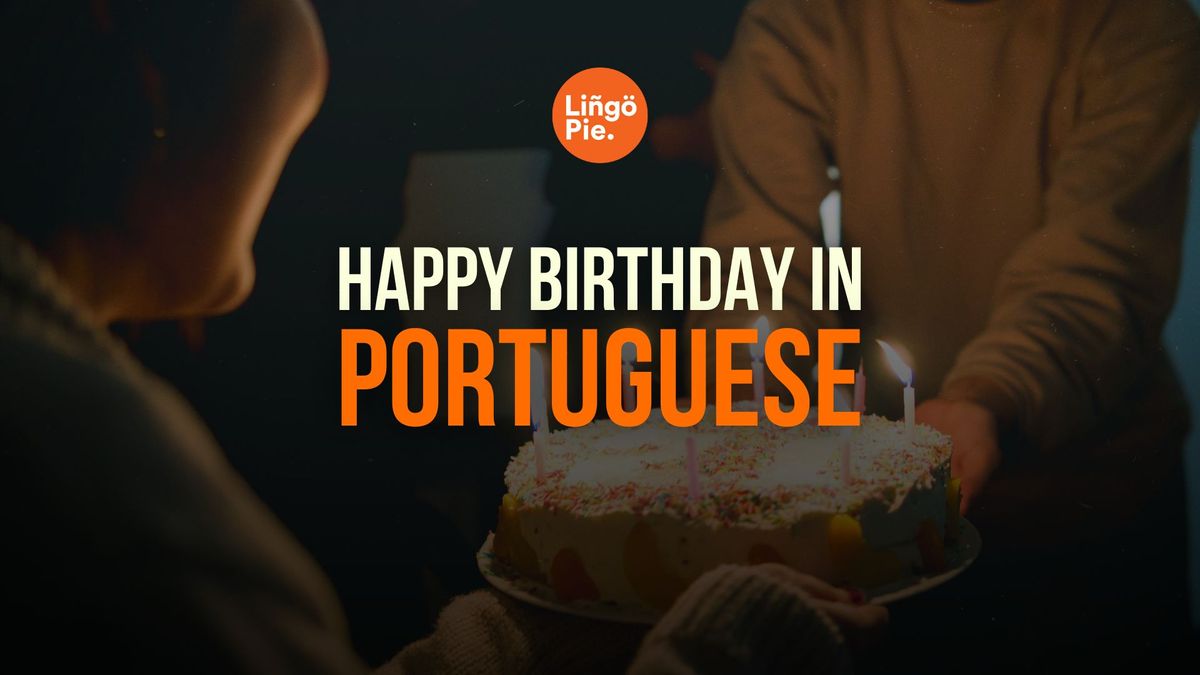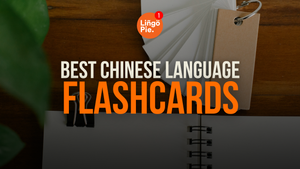Want to win hearts with Chinese love phrases? Saying sweet nothings in Chinese shows you care enough to learn something new. It's a move that works whether you're dating someone who speaks Chinese or just want to stand out with your unique approach to romance.
In this post, I'll show you over 20 essential Chinese love phrases that will take your dating game to the next level. From casual compliments to heartfelt declarations, you'll learn how to express your feelings in Mandarin with confidence. I've included pronunciation guides, cultural context, and practical tips for using these phrases naturally in conversation.
- 5 Chinese Cooking Shows Everyone Learning Chinese Should See
- 7 Romantic Chinese Shows You Need To Watch With Your Partner
- 6 Chinese Short Films Everyone Learning Chinese Should Watch

What Is the Chinese Symbol for Love?
The Chinese symbol for love is 愛 (ài) in traditional form and 爱 in simplified form. Both versions keep the heart component 心 (xīn) at their core, showing that love comes from the heart. The traditional form 愛 has extra elements that suggest action and care, while the simplified form 爱 reduces the strokes but preserves the meaning.
Other common characters connected to love include:
- 情 (qíng) – emotion, used in words like 爱情 (àiqíng, romantic love) and 深情 (shēnqíng, deep affection)
- 恋 (liàn) – romantic attachment, as in 恋爱 (liàn’ài, to be in love)
- 心 (xīn) – heart, seen in phrases like 心动 (xīndòng, heart flutter) and 心上人 (xīnshàngrén, sweetheart)
Together, these asian symbols for love express different shades of love, from first attraction to deep commitment.
Basic Chinese Words For Love
Whether you’re planning to surprise your significant other with sweet phrases or simply expanding your Chinese vocabulary, these essential love-related words and phrases will help you express your feelings with authenticity.
| Chinese Characters | Pinyin | English Meaning | Usage Context |
|---|---|---|---|
| 爱 | ài | love | The most common word for love; used in many contexts |
| 喜欢 | xǐ huān | to like | Less intense than love; can express romantic interest |
| 爱情 | ài qíng | romantic love | Specifically refers to romantic love between partners |
| 我爱你 | wǒ ài nǐ | I love you | The direct expression of love |
| 亲爱的 | qīn ài de | dear, beloved | Term of endearment for a loved one |
| 宝贝 | bǎo bèi | baby, treasure | Affectionate term for a partner or child |
| 思念 | sī niàn | to miss, long for | Express yearning for someone |
| 心动 | xīn dòng | heart flutter | The feeling when someone makes your heart race |
| 甜心 | tián xīn | sweetheart | Affectionate term similar to "sweetheart" |
| 浪漫 | làng màn | romantic | Describing romantic situations or gestures |
| 情人节 | qíng rén jié | Valentine's Day | The holiday celebrating romantic love |
| 心上人 | xīn shàng rén | sweetheart, beloved | Poetic term for the one you love |
First Date Chinese Phrases
1. 你好漂亮/帅 (Nǐ hǎo piàoliang/shuài) - You look beautiful/handsome
This phrase is perfect for making a great first impression on your date. It directly compliments their appearance in a respectful way that shows you're attracted to them. Chinese culture appreciates straightforward compliments when they're sincere, and this is appropriate even when meeting someone for the first time.
Pronunciation: "Nee how pee-ow-lee-ang" for women (漂亮/piàoliang - beautiful) and "nee how shwy" for men (帅/shuài - handsome).
2. 认识你很高兴 (Rènshi nǐ hěn gāoxìng) - Nice to meet you
This polite expression shows good manners while keeping the atmosphere friendly and positive. It's slightly more formal than casual greetings but still warm enough for a date. Using this phrase demonstrates respect and consideration, which are highly valued in Chinese dating culture.
Pronunciation: "Ren-shir nee hen gao-shing" with a falling tone on "Rèn," a rising tone on "shí," a falling-rising tone on "hěn," and a high-level tone followed by a falling tone on "gāoxìng."
3. 我想和你约会 (Wǒ xiǎng hé nǐ yuēhuì) - I want to go on a date with you
This direct approach works well in Chinese dating culture where clear intentions are often appreciated. Use this phrase when you want to explicitly ask someone out rather than being vague about your intentions. It shows confidence and genuine interest, which can be attractive qualities to potential partners.
Pronunciation: "Woh shee-ang huh nee yoo-eh-hway" with a falling-rising tone on "xiǎng," a rising tone on "hé," a falling-rising tone on "yuē," and a falling tone on "huì."
This ancient line from The Book of Songs is one of the oldest Chinese love quotes. It means “Only if mountains crumble, rivers run dry, thunder roars in winter, and snow falls in summer, will I stop loving you.”
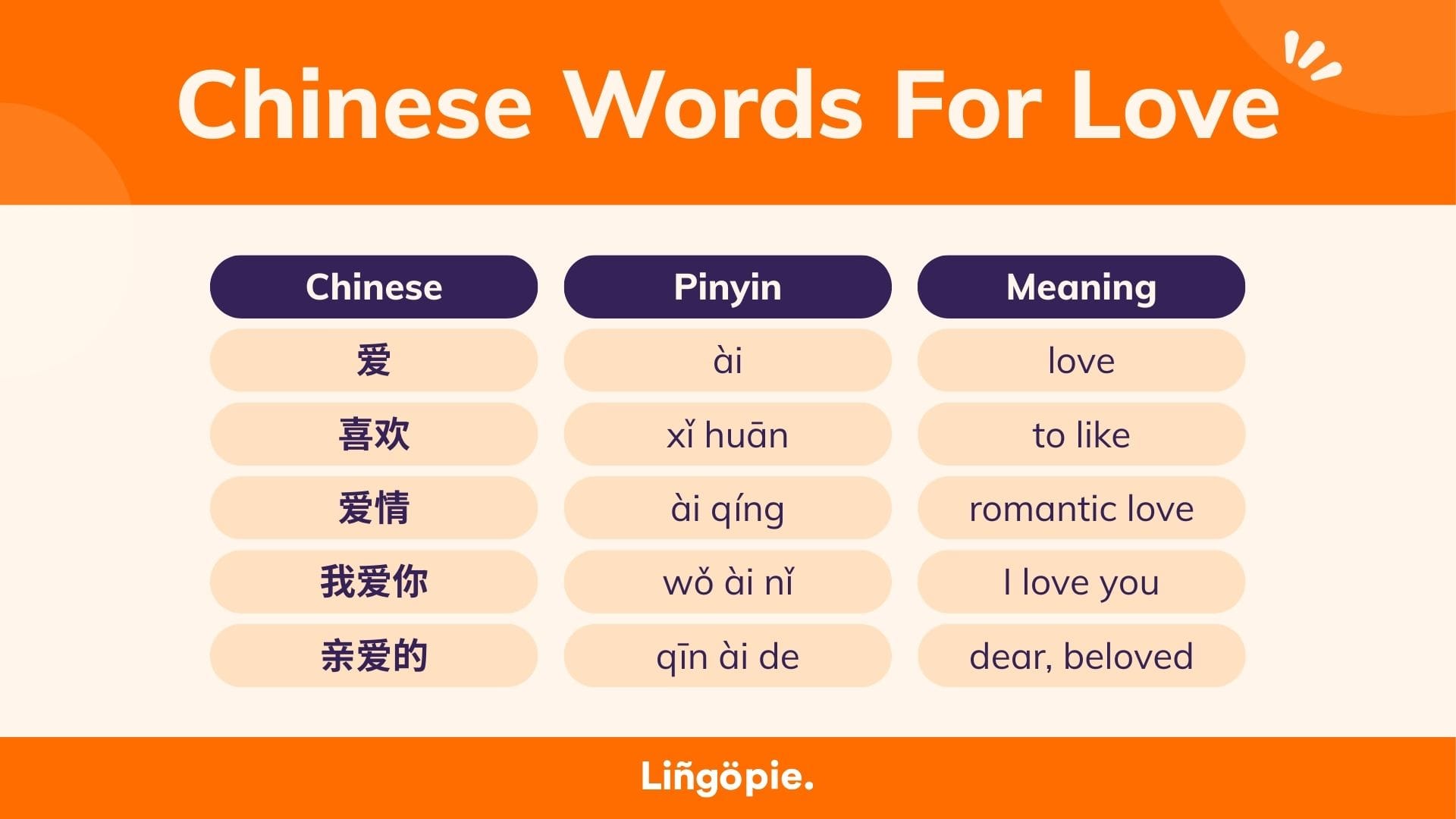
Showing Interest Phrases
4. 我对你有好感 (Wǒ duì nǐ yǒu hǎogǎn) - I have a crush on you
This thoughtful expression helps you reveal your feelings without coming on too strong. It indicates a growing attraction that's more than just friendship but not yet deep love. The phrase suggests you find the person appealing and enjoy their company, making it perfect for the early dating phase when you're still getting to know each other.
Pronunciation: "Woh dway nee yo how-gan" with a falling tone on "duì," a falling-rising tone on "yǒu," a falling-rising tone on "hǎo," and a high-level tone on "gǎn."
5. 我喜欢你 (Wǒ xǐhuān nǐ) - I like you
This key phrase clearly communicates romantic interest beyond casual friendship. It's stronger than saying you have a crush but not as serious as declaring love. Use it after several successful dates when you're sure about your feelings and want to move the relationship forward. In Chinese dating culture, this phrase often marks the beginning of an exclusive relationship.
Pronunciation: "Woh shee-hwan nee" with a falling-rising tone on "xǐ," a high-level tone on "huān," and a falling-rising tone on "nǐ."
6. 我对你有感情 (Wǒ duì nǐ yǒu gǎnqíng) - I have feelings for you
This meaningful expression indicates emotional attachment beyond physical attraction. It suggests your feelings are developing depth and that you're connecting on multiple levels. This phrase works well when the relationship is getting serious and you want to express that your emotions have grown significantly without yet declaring love.
Pronunciation: "Woh dway nee yo gan-ching" with a falling tone on "duì," a falling-rising tone on "yǒu," a falling-rising tone on "gǎn," and a rising tone on "qíng."
7. 我被你迷住了 (Wǒ bèi nǐ mízhù le) - I'm captivated by you
This romantic phrase expresses genuine admiration and attraction in a slightly poetic way. It suggests the person has made a strong impression on you and you find them fascinating or irresistible. Use this after spending quality time together when you want to express that you're truly enchanted by their personality, not just their looks.
Pronunciation: "Woh bay nee mee-joo luh" with a falling tone on "bèi," a rising tone on "mí," a falling tone on "zhù," and a neutral tone on "le."
A famous proverb meaning “Hold your hand and grow old together.” It is among the most quoted Chinese love quotes about lifelong companionship.
Sweet Compliments
8. 你笑起来很好看 (Nǐ xiào qǐlai hěn hǎokàn) - Your smile is beautiful
This specific compliment focuses on something unique about the person rather than general appearance. Mentioning their smile shows you're paying attention to details and appreciating their expressions of happiness. It's a warm, genuine compliment that creates a positive atmosphere and often makes the other person smile even more.
Pronunciation: "Nee shee-ow chee-lye hen how-kan" with a falling tone on "xiào," a falling-rising tone on "qǐ," a neutral tone on "lai," a falling-rising tone on "hěn," a falling-rising tone on "hǎo," and a falling tone on "kàn."
9. 你的眼睛很漂亮 (Nǐ de yǎnjīng hěn piàoliang) - Your eyes are beautiful
This personal compliment shows you're paying attention to your date's features. In Chinese culture, complimenting someone's eyes suggests you see depth in them beyond physical appearance. It's perfect for creating a moment of connection during conversation, especially during those quiet moments when you're looking at each other.
Pronunciation: "Nee duh yan-jing hen pee-ow-lee-ang" with a neutral tone on "de," a falling-rising tone on "yǎn," a high-level tone on "jīng," a falling-rising tone on "hěn," a falling tone on "piào," and a rising tone on "liang."
10. 你很特别 (Nǐ hěn tèbié) - You're special
This meaningful compliment tells someone they stand out from others in your life. It suggests you see unique qualities in them that you value and appreciate. Use this when you want to express that you see something distinctive about them—their personality, values, or the way they treat others—that makes them different from people you've dated before.
Pronunciation: "Nee hen tuh-bee-eh" with a falling-rising tone on "hěn," a falling tone on "tè," and a rising tone on "bié."
11. 你让我心跳加速 (Nǐ ràng wǒ xīntiào jiāsù) - You make my heart beat faster
This flirty expression describes the physical effect their presence has on you. It communicates attraction in a poetic way that's both playful and romantic. Use this phrase when you want to express physical chemistry without being too direct. It works well in lighthearted moments when you want to create a romantic atmosphere.
Pronunciation: "Nee rang woh shin-tee-ow jya-soo" with a falling tone on "ràng," a high-level tone on "xīn," a falling tone on "tiào," a high-level tone on "jiā," and a falling tone on "sù."
Literally “Love at first sight.” This short phrase is one of the simplest Chinese love quotes, capturing instant attraction.
Getting Closer Phrases
12. 我想你 (Wǒ xiǎng nǐ) - I miss you
This simple but powerful phrase communicates that you've been thinking about someone during your time apart. It shows emotional attachment and that their absence affects you. Use this when you haven't seen each other for a while and want to express that they've been on your mind, creating a sense of emotional closeness even during physical distance.
Pronunciation: "Woh shee-ang nee" with a falling-rising tone on "xiǎng" and a falling-rising tone on "nǐ."
13. 我们在一起吧 (Wǒmen zài yìqǐ ba) - Let's be together
This direct request marks an important step in Chinese dating—asking to begin an exclusive relationship. It clearly communicates your intentions and desire for commitment without ambiguity. The phrase is commonly used when both people have been dating for a while and seem ready for a more serious connection, similar to "Will you be my girlfriend/boyfriend?" in Western dating.
Pronunciation: "Woh-men zai ee-chee bah" with a falling tone on "zài," a falling tone on "yì," a falling-rising tone on "qǐ," and a neutral tone on "ba."
14. 我喜欢和你在一起的感觉 (Wǒ xǐhuān hé nǐ zài yìqǐ de gǎnjué) - I love how I feel when I'm with you
This thoughtful expression focuses on the emotional impact of your time together. It communicates that being with them brings you happiness, comfort, or excitement without the pressure of saying "I love you." Use this when you want to express that your relationship positively affects your emotional state and you value the feelings they inspire in you.
Pronunciation: "Woh shee-hwan huh nee zai ee-chee duh gan-jweh" with a falling-rising tone on "xǐ," a high-level tone on "huān," a rising tone on "hé," a falling tone on "zài," a falling tone on "yì," a falling-rising tone on "qǐ," a neutral tone on "de," a falling-rising tone on "gǎn," and a rising tone on "jué."
This modern expression means “I am willing to walk with you to the end of the world.” It is often used in contemporary Chinese love quotes to show deep commitment.
Serious Commitment Phrases
15. 我爱你 (Wǒ ài nǐ) - I love you
This powerful declaration holds significant weight in Chinese culture and isn't said casually. It represents deep emotional commitment and serious intentions toward a long-term relationship. Unlike in some Western contexts, this phrase typically signifies that you see a future with this person and are ready for a committed partnership, so save it for when your feelings are certain and the relationship is established.
Pronunciation: "Woh eye nee" with a falling tone on "ài" and a falling-rising tone on "nǐ."
16. 你是我的一切 (Nǐ shì wǒ de yíqiè) - You are my everything
This profound statement expresses total devotion and indicates the central role someone plays in your life. It suggests they fulfill your emotional needs completely and that your happiness depends significantly on them. Use this only in serious, long-term relationships when expressing deep commitment, as it carries strong implications about the importance of your partner in your life.
Pronunciation: "Nee shir woh duh ee-chyeh" with a falling tone on "shì," a neutral tone on "de," a rising tone on "yí," and a falling tone on "qiè."
17. 我对你深情款款 (Wǒ duì nǐ shēnqíng kuǎnkuǎn) - I have deep affection for you
This elegant expression describes mature, enduring love rather than just passion or infatuation. It suggests your feelings have depth, sincerity, and lasting power. The phrase has a slightly poetic quality that makes it special for important moments in a relationship when you want to express that your feelings have grown into something profound and meaningful.
Pronunciation: "Woh dway nee shen-ching kwan-kwan" with a falling tone on "duì," a high-level tone on "shēn," a rising tone on "qíng," a falling-rising tone on "kuǎn," and a falling-rising tone on the second "kuǎn."
18. 我想和你共度余生 (Wǒ xiǎng hé nǐ gòngdù yúshēng) - I want to spend the rest of my life with you
This serious commitment phrase is essentially a marriage proposal or declaration of lifelong intentions. It clearly communicates that you see a permanent future with this person and want to build a life together. Use this only when you're certain about wanting a lifelong commitment, as it creates expectations about marriage or similar long-term plans.
Pronunciation: "Woh shee-ang huh nee gong-doo yoo-sheng" with a falling-rising tone on "xiǎng," a rising tone on "hé," a falling tone on "gòng," a falling tone on "dù," a rising tone on "yú," and a high-level tone on "shēng."
Chinese Terms of Endearment
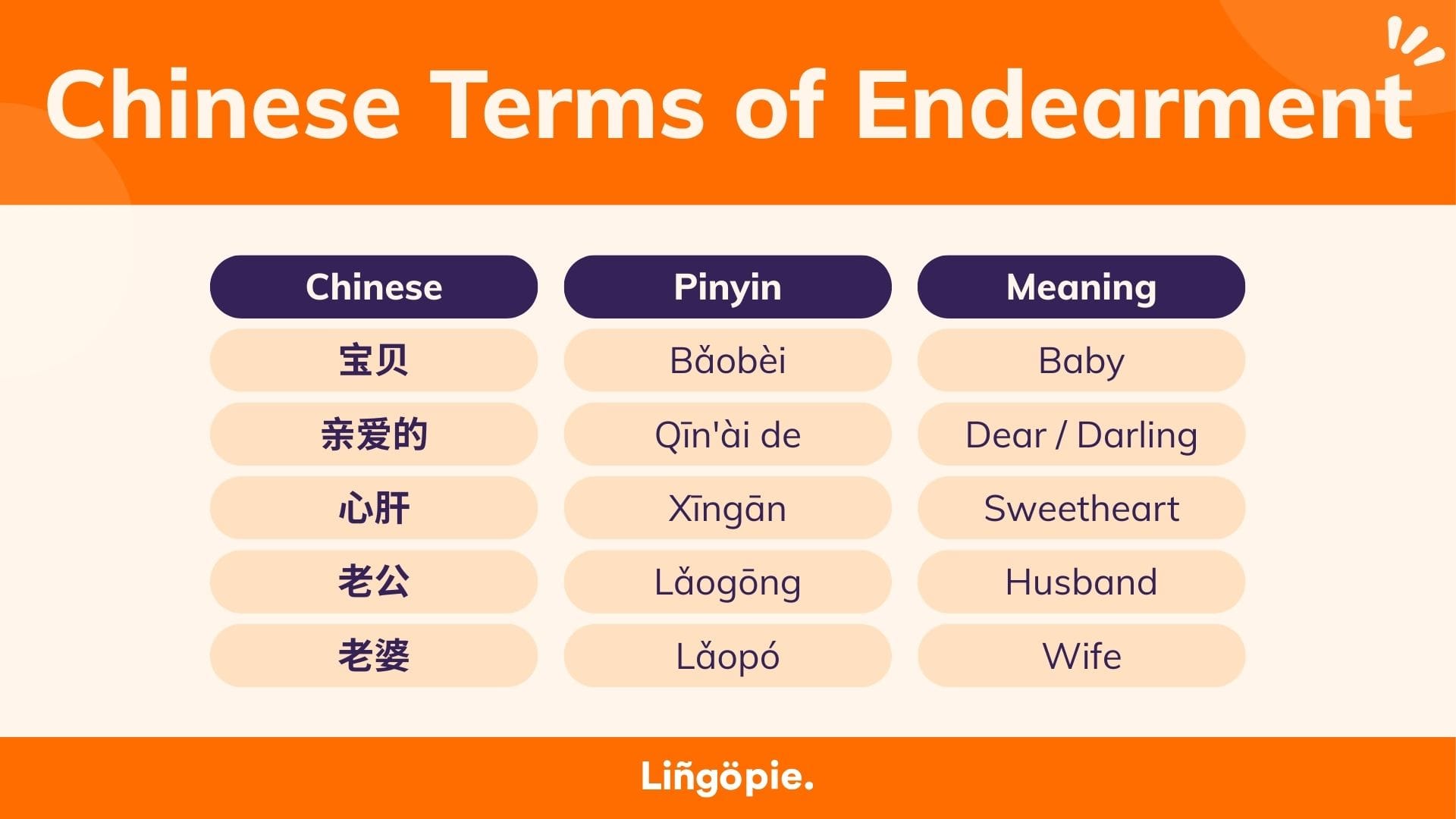
Pet names and sweet nicknames are an important part of Chinese dating culture. Just like in English, couples often use Chinese terms of endearment to show closeness and affection. These words can be playful, romantic, or traditional, depending on the relationship.
| Chinese Term | Pinyin | Meaning | Pronunciation | Usage Context |
|---|---|---|---|---|
| 宝贝 | Bǎobèi | Baby | "Bao-bay" | Common between couples at all stages |
| 亲爱的 | Qīn'ài de | Dear / Darling | "Chin-eye duh" | Used in established relationships |
| 心肝 | Xīngān | Sweetheart (lit. heart and liver) | "Shin-gan" | Traditional, shows deep attachment |
| 老公 | Lǎogōng | Husband | "Lao-gong" | Often used before marriage too |
| 老婆 | Lǎopó | Wife | "Lao-poh" | Often used before marriage too |
| 小甜心 | Xiǎo tiánxīn | Little sweetheart | "Shyow tyen-shin" | Cute nickname for girlfriend |
| 亲爱 | Qīn'ài | Beloved | "Chin-eye" | Similar to "darling" but shorter |
| 小可爱 | Xiǎo kě'ài | Little cutie | "Shyow kuh-eye" | Playful nickname for either partner |
Using Chinese terms of affection can make conversations warmer and more personal. They are not limited to couples—parents may call children 宝贝 (bǎobèi, baby), and friends sometimes use playful nicknames like 小可爱 (xiǎo kě’ài, little cutie). Learning these expressions helps you understand everyday Chinese communication and makes your speech more natural.
A classical line by poet Qin Guan: “If two hearts are meant to last, why worry about being together every morning and night?” This is one of the most poetic Chinese love quotes about enduring love despite distance.
Ready To Learn Chinese?
Learning Chinese love phrases is a fantastic way to make your dating life more exciting and meaningful. Not only will you impress your date, but you'll also show genuine interest in connecting on a deeper level.
Want to take your Chinese language skills beyond just dating phrases? Try Lingopie's immersive language learning platform. With Lingopie, you can learn Chinese through fun TV shows and movies, making the language-learning process enjoyable and effective. Start your journey today and surprise your date with more than just basic phrases on your next meetup!
FAQ
How to write “I love you” in Chinese?
The phrase is written as 我爱你 (wǒ ài nǐ). 我 means “I,” 爱 is the key character among Chinese love words, and 你 means “you.” Together, it literally means “I love you.”
How to say “I like you” in Chinese?
The phrase is 我喜欢你 (wǒ xǐhuān nǐ). 喜欢 means “to like,” and it is one of the softer love words in Chinese, often used at the beginning of a relationship or when showing affection without being too direct.
How to say “I love you” in Chinese Cantonese?
In Cantonese, you say 我愛你 (ngóh oi néih). 我 is “I,” 愛 means love, and 你 is “you.” It is another example of how Chinese love words appear consistently across dialects, even if the pronunciation changes.




